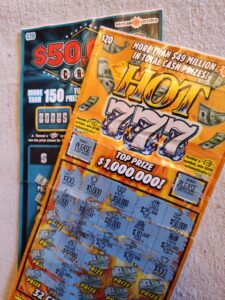05 Feb Feeling Lucky
People are lucky. If you make it as one of us (meaning humans), you’re doing alright. Just to be alive and breathing at this moment, you’ve overcome tremendous challenges genetically, geographically, and historically. From the very (and I mean very) beginning, you won your first swim meet. That’s on top of untold generations of wiggling winners before you were even a statistical improbability.
You paraded your way into existence like you belong here. Good for you!
With victories like these in hand, it feels foolish not to lean on that hot steak and play the lottery. If there’s a better place for the Everyman to dance with Lady Luck, I’d love to hear about it.
That’s the impression I get looking at these harbingers of good fortune I found on a recent run. The Maryland Lottery system wants you to win. You can feel it just by looking at them.

But is it the best place to spend our luck?
Lotteries have always been the wild horses of financial gain. Many a government has fallen for the siren song of funding this or that civic project by hitching their wagons to these unruly ponies. The wagons don’t always fare so well as the gentle trot almost always turns into a nostrils-flaring stampede to get cash at any cost.
History.
Before our current halcyon days of scratch-offs and cashing out at the local liquor store, lotteries were used in a variety of ways. A few thousand years ago, the leaders of nascent Israel dispersed their newfound promised land by lot. This has been a very long mixed-results process that is still being worked out today. The OG Greeks used their trusty Kleroterion (the original randomizer) to put officials in office. And ancient Roman hosts were known to disperse patterned bits of wood that were turned in at the end of a party for door prizes. Word nerd shout-out: this was known as an apophreta (Greek for “that which is carried home”).
The modern lottery began to take shape in the 15th century (way to go, Renaissance). Francis I of France and Queen Elizabeth I of England signed off on lotteries to support their national coffers. A few years later in England, King James I took a break from translating Bibles to give the Virginia Company permission to hold a fund-raising lottery to fund their settling of Jamestown. He likely had little idea what a wild stallion was headed his way. That little settlement helped found a country not only of rebels, but also rogue Bible translators that would crowd the market for his humbly appelated take on scripture.
While British lotteries were busy paying for projects like the British Museum, infrastructure repairs, and the American colonies, the uber-fresh American Continental Congress seriously considered the lottery as a way to fund their war against the British. This idea was ultimately abandoned as a national lottery was considered to be subpar behavior, unlike national rebellion. You’ve got to draw the line somewhere.
Despite the initial reluctance to institute lotteries in the American colonies, the old world practice soon jumped across the pond. As is often the case in big-money matters, even the staunchest haters couldn’t ignore the piles of money associated with lotteries, and loopholes soon appeared in the collective American disdain. Smaller lotteries, known as “voluntary taxes,” helped build the institutions of Harvard, Yale, Columbia, William and Mary, and Brown. These lucky lotto schools have come a long way. You no longer need to purchase tickets to support them, you can just give them a bunch of money directly.
Once the way was paved for financially-solvent centers of higher education, the stance on lotteries once again shifted in the US. In 1878, the supreme court ruled that lotteries had a demoralizing influence on the citizens of their great nation, and in 1890, President Benjamin Harrison and congress agreed (AGREED!) that lotteries were “swindling and demoralizing agencies,” and prohibited interstate transportation of tickets. For those of you keeping track, that’s all three branches of government agreeing on a single subject within a twelve year period. The odds of this happening are roughly the same as you winning the next powerball.
Speaking of odds…
The MD lotto website headlines are pretty positive about the big winners who walk away with cash. While this makes for a nice change from the normal tone of the news, let’s talk about the actual odds of winning.
I’m no statistician, so I’ll go ahead and lean on my trusty assistant, Bing Chat, for some numbers guidance. The odds of winning the $50,000 prize is about 1 in 480,000. To put this in perspective, imagine laying out 6 inch long lottery tickets from New York to Philadelphia. Only one of these tickets gets you the money. Now, put on a blindfold and walk along this trail of potential tickets, then stop at random and pick up the winner. That’s the same odds you have of winning this $50,000 prize.
If the odds are that bad anyway, we may as well shoot for the moon, right? Let’s talk about the big money. If we were to apply this same logic to the powerball lottery, you would once again line up your lotto tickets (again with only one winner). Only this time, the line wraps all the way around the US border (Canada, Mexico, and coastlines) 2.5 times. Take water on your walk, because this 2.5 lap trek around the US is roughly 60,000 miles long (accounting for intricacies of our shorelines). When you feel lucky on this journey, stop and pick up a ticket and hope that it’s a winner. These are your odds with a pretty large margin of error, but you get the point.
Corruption Making Our Own Luck
By now, you might be asking the question, BUT WAIT, I THOUGHT HUMANS WERE SUPPOSED TO BE LUCKY! If you’re feeling grim about your chances of ever winning the lottery, take heart. You don’t have to just sit there and lose, there are ways to increase your luck.
Given the nature of lots of money and apparent chance, lotteries are ripe for corruption and scandal. It’s been this way for quite some time. In France, King Louis XIV and some of his royal buddies had the tendency to win top prizes in “random” drawings. The Louisiana State Lottery grew so corrupt the US government banned interstate transportation of lottery tickets. And as long as there have been authentic lottery tokens, there have also been forgeries. This might be bad news for lottery PR, but it’s a great chance to use some ingenuity and get in there and win some money.
Let’s look at a few ways people have tried to manufacture their own good fortune.
Burn the Evidence!
A famous example is the 1980 Pennsylvania Lottery Scandal, or the Triple Six Fix. Masterminded by lottery host, Nick Perry, this scandal had all the trimmings of Ocean’s Eleven knocking off the Bellagio. Well, maybe not all of it, but there were minions involved, cleverly timed access to the machine, crooked officials, and burning the evidence.
Here’s how it worked. Perry cooked up the plan with a business partner. They had replicas of the drawing balls created. The difference being that the 4 and 6 balls were the lucky ones, a bit lighter than the others and more likely to be drawn. A stagehand was brought in on the scam to swap the balls just before and after the drawing. Then Perry burned the counterfeit balls in a paint can in his office.
On the day of the drawing, more accomplices drove around the state purchasing tickets with the 8 most likely combinations. Turns out they won pretty big. Unfortunately for them, people who love to think about odds also love to look for oddities. They noticed an unusually high number of winners based around the numbers that “just happened to come up.” An investigation and series of trials landed most of the involved conspirators in prison.
I Don’t See a Problem Here
The second scandal happened in Italy in the late nineties. It again involved ball selections being tampered with. Understand something here, lottery officials felt like they had a fool-proof system for obtaining completely random numbers. Was it a state of the art machine or a complex computer system? Nope.
It was blindfolded children. What a stroke of genius! Is there anything more morally sound than a child? I mean, as any parent or grandparent will tell you, kids are impervious to bribery. My kids certainly never change their behavior for an ice cream cone or a few extra minutes of screen time. Why would we expect anything different when there’s big money on the line?
Because we never learn, that’s why! Over the course of a few years, crooked officials not only bribed the kids, but “tempered” the balls by heating or cooling them so the kids knew which ones to draw. Other methods included loose blindfolds (COME ON PEOPLE) and extra glossy balls to tip the kids off. Over the years, the lottery lost almost two hundred million dollars to this scam.
Shockingly, people were morally outraged when the truth came out. Of course they were. If you can’t trust institutions that blindfold children, who can you trust?
Like Father, Like Son, and other Son
Finally, we have this little gem from Massachusetts. The plan involves a pretty common lottery scam called “Ten Percenting.” This scam is great for people with a history of bad luck who suddenly come across some good luck. For instance, let’s say a bunch of people want your money. I’m talking about the kind of people who can garnish your income, be it wages or winnings. That’s your bad luck. Then, in a bout of karmic balance, you win the lottery. Normally, it’s an unmitigated celebration to get money. However, the shine gets tarnished if you have a backlog of borrowers who will sniff out your good fortune and seize those winnings.
That’s where the scam comes in. A benevolent payout protector will happily buy your winning lottery ticket (at a discounted price) and cash it out as their own. Ergo, you get some cash, they get some cash, and the taxman is kept in the dark about the shred of happiness you’ve stumbled across.
This scam happens pretty often, but it doesn’t scale so well. Someone should have told Ali , Yousef, and Mohamed Jaafar. Over the course of a few years, they cashed in over 14,000 winning tickets in Massachusetts alone. Statisticians tend to notice this kind of anomaly. When a low-odds event happens well over 10,000 times, that’s a trigger for these folks. A brief investigation has landed each of these men with fines and prison time.
If you’re considering manufacturing a bit of luck for yourself, you should know that each of these scandals ended in large fines and/or prison time, not to mention whittling away at the classy good name so often associated with lottery machines and TV drawings. It seems scammers get caught for the same reason they got into the lottery in the first place – trying to make a quick buck. Rather than play it cool, they push and push until their anomalous winnings trigger an investigation that quickly uncovers the scam.
As far as my own (found) tickets go, they are not winners. I assume this because they were laying in the grass beside my driveway. I thought about checking, but ultimately I decided against it because, as mentioned in the first paragraph, I’m already pretty lucky to be here, no sense in pushing it. Who really needs piles of money anyway?

No Comments